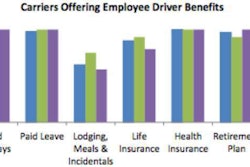If 2014 is anything like previous years, it’s expected there will have been about 5.6 million motor vehicle accidents on American highways this year.
One of those accidents occurred at about 1 a.m. on June 7 on the New Jersey Turnpike near Cranbury, NJ, and it sent shockwaves through the trucking industry. That’s when a 2011 Peterbilt owned by Walmart and driven by Kevin Roper collided with a Mercedes Sprinter limo carrying comedian Tracy Morgan and several other people, including comedian James McNair, who died in what became a six-vehicle pile-up.
That accident – the repercussions of which will continue to be felt in the year ahead — was one of the top stories of 2014, a year that was loaded with big stories. Here’s a countdown of the top trucking stories of the year gone bye, which also serves as a preview of what most likely be in the news in 2015.
Class 8 Truck Sales
Large numbers of Class 8 truck were sold in 2014, and many more orders are in the pipeline for the year ahead; same with trailers. Sales spiked in October with 46,245 trucks sold, followed by 40,560 in November. Among the trucks sold was a Freightliner Cascadia Evolution delivered to Schneider this summer, the 3 millionth truck produced by Daimler Trucks North America. And, as the year came to a close, Kenworth delivered its 1 millionth truck, a T680 Advantage purchased by TransAm Trucking.
Autonomous Truck Developments
The future (?) of trucking arrived in early July when Daimler introduced its Future Truck 2025 concept truck on a stretch of autobahn west of Berlin. The manufacturer unveiled a vehicle with a radar system that scans in front, to the rear and on both sides as well as vehicle-to-vehicle communications. An introductory video shows the truck’s driver with his hands on a tablet computer instead of the steering wheel. In September, Peterbilt showed off its Model 579 concept autonomous truck at the Intelligent Transport Systems World Congress in Detroit.
Truck Parking
With demand and the number of trucks on the road growing, the amount of parking — especially spaces in safe and secure places — available was shrinking in 2014. This was brought into sharp focus in June, when 31-year-old Michael Boeglin was shot several times in his truck (which was burned by his attackers) parked in an area of Detroit he thought was safe while he waited for a load of steel. A survey by the American Transportation Research Institute found parking to be an industry-wide concern, as did a list of recommendations from the FMCSA’s Motor Carrier Safety Advisory Committee. The year saw testing of a multi-media system to alert drivers to available parking on some stretches of interstates. But, 2014 also saw the passage of numerous local “no truck parking” ordinances.
Electronic Logging
In March, the Federal Motor Carrier Safety Administration (FMCSA) set in motion the process that to mandate the use of electronic logging devices (ELD) by all drivers who are currently required to keep paper records of their duty status. Carriers and drivers would not be required to install or use a logging device until two years after the effective date of the final rule. As the year ended no date had been set for making the final rule.
Speed Limiters
The FMCSA had a busy year, also starting work on regulations that would require governors – a.k.a. speed limiters – on all Class 8 trucks. The push for speed limiters is nothing new; the process dates back to 2006. The FMCSA says requiring speed limiters would have minimal monetary impact and could reduce truck-related fatalities by more than 1,100 deaths per year. This will be a continuing saga in 2015.
Wal-Mart Suit
In September, U.S. District Judge Susan Illston in California ruled a lawsuit brought by drivers in 2008 against Wal-Mart Transportation could proceed as a class-action lawsuit. The drivers claim that since 1993, they did not receive the minimum wage required by state law, nor were they allowed to take their state-required meal and rest breaks. They also claimed they did not receive proper wage statements. A federal appeals court ruled in July that drivers in California are entitled to the state’s mandatory meal and rest breaks. The Wal-Mart case, however, could test both state and federal laws governing driver pay methods. Illston granted the plaintiffs’ request to certify the waiting-time penalty and minimum wage claims as class-action, but denied their request to grant certification to wage-statement claims.
Resignation of Anne Ferro from FMCSA
After raising the ire of much of the trucking industry for five years, Federal Motor Carrier Safety Administrator Anne Ferro announced her resignation in July. She assumed a job as the head of the American Association of Motor Vehicle Administrators, but not before at least one major trucking organization called for her resignation. On Ferro’s watch, the FMCSA implemented new hours-of-service rules, worked on electronic log rules, took on the issue of so-called “chameleon carriers,” created a pre-employment screening program, revamped the medical certification program, installed the Compliance, Safety, Accountability program and banned hand-held cell phones from truck cabs.
Tracy Morgan Crash
On that early morning in June when a Walmart truck collided with Tracy Morgan’s Mercedes Sprinter on the New Jersey Turnpike, events were set in motion that brought close scrutiny of hours-of-service regulations and near-hysterical coverage by the popular press. Kevin Roper, the 35-year-old driver who had traveled from his home in Georgia to a Walmart terminal in Delaware before beginning his trip, was charged with vehicular homicide and assault by auto. He also faces civil suits. At the time of the accident, police suggested Roper was fatigued from driving from Georgia to Delaware before beginning his driving shift. Since then, Walmart suggested Morgan and others in the limo were at fault for their injuries because they were not wearing seat belts at the time of the crash. Roper asked to have civil actions against him delayed until after his criminal case was hear; a judge rejected that that request.
Driver Shortage & Driver Pay Increases
If there was a continuing theme throughout 2014, it was the large and growing shortage of drivers. The American Trucking Associations says 35,000 new drivers are needed, and that number is expected to continue to grow. It’s said there are several causes for the driver shortfall: many drivers are “aging out” of the industry, young people are not coming into it and the steadily improving economy is creating a demand for goods that need to be delivered. At least as a partial response, many trucking companies increased pay, benefits and other perks such as more time at home. Some fleets upgraded equipment, and many aimed considerable recruiting efforts at veterans returning from war and leaving the service.
Hours of Service Regulations Rollback
As the last days of 2014 and the last minutes of the 113th Congress ticked off the clock, a massive spending bill was approved by the U.S. House of Representatives and then by the U.S. Senate, and signed into law by President Obama. Tucked in the legislation was a roll back of the hours-of-service regulations that limit how many hours truckers can drive, and a directive forcing the Federal Motor Carrier Safety Administration (FMCSA) to study those rules before reenacting them or installing new ones. But, the issue is far from dead. But, the rollback is in effect just until the end of next October, and between now and the more study will be done.












